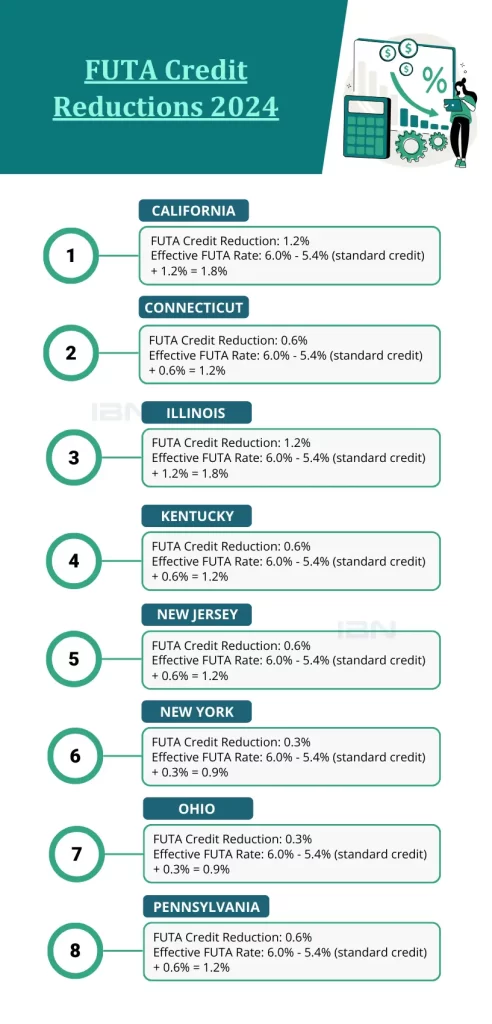Payroll management is one of the most critical responsibilities of a small business. Among the various payroll taxes, the Federal Unemployment Tax Act (FUTA) tax is particularly important for employers to understand.
In this guide, we’ll explain what FUTA is, outline when your business needs to pay for it and share tips to ensure you handle it correctly. By understanding FUTA taxes, you can stay compliant and avoid any potential penalties. Let’s simplify the process and make it easier for you to manage your payroll obligations.
Overwhelmed by FUTA tax calculations? Let our experts simplify your payroll process. Schedule a free consultation today!
Table of Contents
- Understanding the Federal Unemployment Tax Act
- Example of FUTA Tax
- States with Reduced Credit
- FUTA Tax Requirements
- Tax exemptions for FUTA
- How to Calculate FUTA
- Factors that impact FUTA tax
- Final Word
- FUTA Tax FAQs
Understanding the Federal Unemployment Tax Act
It is a federal law that requires employers to contribute to unemployment insurance taxes known as the Federal Unemployment Tax Act (FUTA). These funds support the federal government’s oversight of unemployment programs across all 50 states. It’s important to note that FUTA is not directly deducted from employee wages; instead, employers handle it through specific processes.
Let’s break down the key aspects of FUTA:
Tax Management Employers handle FUTA taxes in two main ways:
- Quarterly Deposits: If necessary, employers make quarterly deposits of FUTA taxes.
- Annual Filing: Employers file an annual form to report their FUTA tax contributions.
The Federal Unemployment Tax Act (FUTA) imposes a 6% tax on the first $7,000 of wages paid to each employee per year. However, if you qualify for the maximum credit reduction of 5.4% for timely state unemployment tax payments, your effective FUTA tax rate reduces to 0.6%. This means you pay only 0.6% on the first $7,000 of wages for each employee.
Employers may be eligible for a credit of up to 5.4% if they pay their State Unemployment Tax Act (SUTA) taxes on time, effectively lowering the Federal Unemployment Tax Act (FUTA) rate to 0.6%.)
- Standard Credit: The standard credit is 5.4% of the FUTA tax rate. For 2024, the FUTA tax rate is set at 6.0%, so this credit reduces the effective rate to 0.6% (6.0% – 5.4%).
- State Unemployment Tax Act (SUTA) Contributions: To qualify for the credit, employers must pay SUTA taxes in each state where they have employees. Each state determines its own unemployment tax rate and wage base.
- Credit Reductions: If a state has borrowed funds from the federal government to cover unemployment benefits and has not repaid the loan, a credit reduction may apply. This would reduce the standard 5.4% credit. The IRS annually publishes a list of states subject to credit reductions.
- Claiming the Credit: Employers can claim this credit by filing Form 940, the Annual Federal Unemployment (FUTA) Tax Return. The credit amount is calculated on this form based on the SUTA taxes paid.
- State-Specific Variations While FUTA is a federal tax, SUTA is state-specific. Employers should be aware that both FUTA and SUTA tax rates and wage base amounts can vary by state. It’s always a good idea to check with your state’s taxing authority for the most accurate information regarding SUTA requirements.
Remember, understanding FUTA and its implications ensures compliance and responsible management of unemployment taxes.
In a credit reduction state? Contact us to ensure you’re not overpaying on FUTA taxes – Get a personalized assessment now!
Example of FUTA Tax
The maximum annual FUTA tax per employee is $54 (based on a $9,000 wage base and a 0.6% tax rate). For an employee earning $6,500 per year, the FUTA tax would be $39.
States with Reduced Credit
To pay unemployment benefits, states may need to borrow money from the federal government. (This was particularly valid throughout the epidemic.) In particular, money from the Federal Unemployment Trust Fund is borrowed by the states.
A state that obtained funding from the trust fund but did not pay it back by the deadline is said to be in FUTA credit reduction status. When this occurs, the state is usually designated as a credit reduction state for FUTA taxes by the Department of Labor.
Your business might not be able to receive the full credit against your FUTA tax rate if a firm pays salaries that are subject to unemployment tax in a state that has credit reduction laws.
As a result, until your state repays the remaining loan debt, your company could have to pay higher unemployment taxes for each employee.
The following states will have credit reduction rates in 2024:

FUTA Tax Requirements
First off, you might need to file Form 940 and pay FUTA tax if you have non-household employees or farmworkers. Here’s how to figure it out:
Ask yourself these two questions:
- Did your business shell out $1,500 or more in wages during any quarter of 2021 or 2022? Think about those busy seasons!
- Did you have at least one employee show up for work (even for just part of a day) for 20 or more weeks in year? This includes your holiday help!
If you’re nodding “yes” to either of these, you’re probably in FUTA territory.
Now, a few things to keep in mind:
- No consecutive 20 weeks are required.
- All employees, including temporary, part-time, and full-time workers, count.
- Self-employed individuals are generally not subject to FUTA tax.
- Partners in a legal partnership (Form 1065) are not considered employees for FUTA purposes.
- Shareholders and corporate officers in S corporations (Form 2553) might be subject to FUTA tax.
Not all employers are subject to FUTA tax. In the following section, we’ll discuss the exceptions.
Tax exemptions for FUTA
Some businesses are exempt from FUTA tax. Exceptions include employers of household employees, agricultural employers, Indian tribe governments, tax-exempt organizations, and state and local government employers. Certain fringe benefits may also be subject to FUTA tax. For more details, refer to IRS Publication 15-B and Chapter 14 of the Employer’s Tax Guide.
How to Calculate FUTA
To calculate FUTA tax, follow these three key steps: determine taxable wages, compute your liability, and check if it’s time to pay up.
Step 1: Determine Wages Subject to FUTA
- Identify the wages paid to employees during the reporting period that are subject to FUTA tax.
- Example:
- John: $6,500
- Bob: $3,500
- Charlie: $5,000
- Total Wages Earned in Q1: $15,000
- Example:
Step 2: Calculate FUTA Liability
- Multiply the total quarterly wages subject to FUTA by 0.6% (assuming you’re eligible for the full 5.4% credit reduction).
- Calculation: $15,000 x 0.006 = $90 FUTA Liability for Q1
Step 3: Check Payment Threshold
- If your FUTA tax liability is $500 or less, you can carry it over to the next quarter.
- In this example, since the FUTA liability is $90, no deposit is required for Q1.
Factors that impact FUTA tax
In addition to these factors, others may affect FUTA tax calculations. These include:
- Credit Reduction States
It is possible for you not to receive the maximum credit if some or part of the wages of these employees are paid in credit states.
In the above example, if John is paid wages in a credit reduction state — let’s say New York — the employer will not get the full 5.4% credit on his wages for 2024.
- State Unemployment Tax Credits
Employers typically receive a credit for state unemployment taxes paid by January 31st or February 10th (if your Form 940 is due then). This credit can reduce their FUTA tax liability.
- Experience Ratings
Employers with a lower state experience rate (below 5.4%) might qualify for an additional credit, further reducing their FUTA tax burden.
- Corporate Officers and Fringe Benefits
In certain states, wages paid to corporate officers or fringe benefits might not be subject to state unemployment tax (SUTA), but they could still be subject to FUTA at the maximum rate.
Final Word
Proper FUTA tax management is vital for your business’s success. Accurate calculations and timely payments are crucial, whether handled in-house or through payroll services. Many payroll services assist with tasks like computing unemployment tax rates, depositing taxes, and filing Form 940, simplifying the process.
By partnering with IBN Technologies, businesses can streamline their FUTA tax management processes, reduce administrative burdens, and focus on core business operations. With IBN Technologies’ expert tax preparation support, you can confidently navigate the complexities of FUTA tax and ensure long-term financial success.
For more detailed information, download our Tax E-books.
Master FUTA taxes with ease—partner with IBN Technologies for seamless payroll and tax solutions. Get started with IBN today!
FUTA Tax FAQs
Q.1 What is the FUTA tax in the US?
FUTA (Federal Unemployment Tax Act) is a federal tax that employers pay to fund unemployment benefits. It applies to the first $7,000 of each employee’s annual wages.
Q.2 Who is subject to the FUTA tax?
Employers who pay at least $1,500 in wages in any quarter or have employees working at least 20 weeks in a year are subject to FUTA tax.
Q.3 What employees are exempt from FUTA?
Certain employees, such as family members, agricultural workers, and some nonprofit employees, may be exempt from FUTA.



